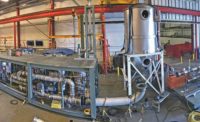Intermountain Specialty Contractor of the Year: CCI Mechanical Stays the Course
When the recession hit, CCI Mechanical Inc. of Salt Lake City decided not to change its pricing strategy, enter new markets or chase work outside its core focus. Instead, the mechanical contractor chose to stay the course, honoring its long-standing commitment to customer service.


The decision seems to be paying off. Leveraging more than five decades of experience, CCI continues to be a specialty leader in the Intermountain area, providing HVAC engineering, preconstruction, construction and maintenance services for commercial and industrial facilities.
In 2010, the company wrapped up several large contracts that contributed to banner revenue of $85.5 million. While business has slowed some since then, the company's revenue has remained stable—at $63.9 million in 2011 and $58.3 million in 2012—and the company expects to post $62.5 million for 2013, according Mike Buell, CCI's client development director.
"Our strategy was to do as we've always done—stay focused on what we do, on our niches and on our relationships with our customers. Our business is driven by loyal and repeat customers," says Davis Mullholand, CCI's president. "We were fortunate that certain clients were still building during the downturn and remained loyal to us. Even when low bids were driving the market, project owners wanted to work with us. It didn't matter if our price wasn't the lowest."
The majority of CCI's work is through design-build contracts with general contractors. However, as the largest service and maintenance mechanical company in Utah, the company also interfaces directly with facility owners.
When the commercial market dried up, CCI shifted its focus to its industrial projects, which now account for nearly 50% of the company's business. Those include ongoing work for the Lake Side powerplant as well as processing plants for Malt-O-Meal and Schiff/Reckitt Benckiser.
Additionally, the company devoted more resources to soliciting new service and maintenance business, yet it was cautious not to overextend. Service and maintenance accounts for 30% of the firm's business today, up from 25% in years past.
"While we are always looking for new customers, our existing customers are our first priority. We want to make sure that we can take care of them first," Mullholand says. "We are careful not to stretch ourselves too thin. That is the mistake many firms make, and that is a lose-lose for a company and its customers. If we don't satisfy our customers' needs, then they won't hire us again."
Merit Medical Systems, a manufacturer of disposable medical devices, began its relationship with CCI in 1994. Nearly 20 years later, CCI is still the service and maintenance provider for the company's four buildings—including a South Jordan, Utah, facility where CCI was subcontracted by Jacobsen Construction to install the mechanical systems in 2006.
"In 20 years we never really went looking for another service provider because CCI is reliable and responsive," says Larry Josie, vice president of facilities and production maintenance for Merit Medical Systems.
"The single most important selling point for me is that there is one service technician dedicated to my buildings, and they have a backup crew available as well," says Josie. "We've had the same technician for nearly a decade. He knows my buildings, knows what needs to be done and when, and he knows how to handle problems when they arise."
Layton Construction, Salt Lake City, has worked with CCI for more than 15 years on hundreds of projects—manufacturing facilities, schools, data centers and office buildings. Most recently, Layton contracted CCI to retrofit an 850,000-sq-ft cabinet factory in West Jordan, Utah, for aerospace manufacturer Boeing Co.
Upon completion next spring, the 19-acre facility will manufacture composite horizontal stabilizer parts for the 787-9 Dreamliner jet.
"From one project to the next, CCI's performance is consistent. We know what we're going to get. They meet expectations and deadlines," says Jason Hill, Layton's executive vice president.
"The fact that they have the in-house ability to design, engineer and construct projects is a huge advantage. They do a lot of work in-house that other contractors would sub out. That gives them much more control over the work product," Hill adds.
In-House Prefabrication





